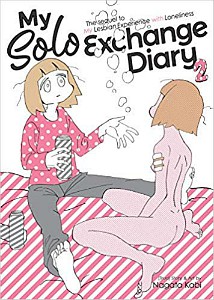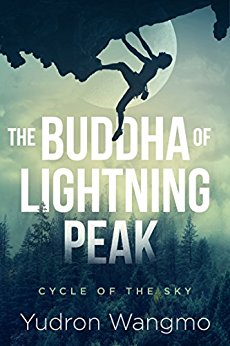My Solo Exchange Diary Volume 2 is another set of autobiographical essays about Nagata Kabi’s life and depression. Where Volume 1 followed her attempts at independence and romantic intimacy while unpicking her relationship with her family, whereas volume 2 finds Nagata Kabi enjoying friendship and emotional intimacy, while her mental health takes a nosedive.
Just like with the first volume, My Solo Exchange Diary can be a rough read. Nagata Kabi is frank about her mental health and the setbacks she suffered – being equally unable to cope with living alone and living with her family, drinking, and voluntary hospitalisation – and that is often harrowing! Sometimes funny, but definitely hard sometimes. Her cartoony style still doesn’t soften any of the blows, and sometimes make it worse, but her art is clean and striking, so it works! (And just on a purely over-analysing level: I love that the cover is finally her reaching out to herself and talking, because I feel like that drawing alone represents so much growth in her attitude to herself and her own pain.)
I think what really struck me for the first time as I read this is that because of the format – a collected edition of visual essays that were originally serialised monthly – it’s actually really tense to read, because you don’t have the same reassurance that the creator must have been fine because they finished the book as you would in a more standard autobiography. It accounts for the significant shifts in tone and subject between the chapters, and the way that she is much more enthusiastic and loving about her family than she was in the first volume, even as she talks about the pain they have caused and still cause her. It makes sense, because My Solo Exchange Diary is very much about the ways that Nagata Kabi’s family hurt her, but still rallied around when she needed them, but it was a little surprising to read.
The depiction of her struggle with independence and her stay in hospital felt very relatable to me, especially in her reactions to being stuck in the hospital without being able to articulate her fear and despair at the idea of having to stay there for months on end. It doesn’t feel advisory or demonstrative, it’s not a “here is what staying in hospital for mental health reasons is like,” it’s just what it was like for her, and the ways in which it helped her and scared her.
Unsurprisingly, My Solo Exchange Diary is still hard and harrowing to read, but it feels more hopeful than the previous volume. Nagata Kabi specifically talks about her support network that cares for her, and there is an epilogue where she recognises that packaging her life in neat little chunks for an audience is maybe not the best choice for her right now, which I’m honestly in favour of because I’d rather she focus on her recovery. Seeing her asking how her future self was doing at the end of some of the chapters broke my heart a little, but gave me hope that she was going to be okay. … Especially because she FINALLY got the hug that she’s been waiting for, and I nearly cried for her.
[Caution warning: alcoholism, depression, hospitalisation, self-harm, suicide attempt]
Susan is a library assistant who uses her insider access to keep her shelves and to-read list permanently overflowing. She can usually be found writing for Hugo-winning media blog Lady Business or bringing the tweets and shouting on twitter.



